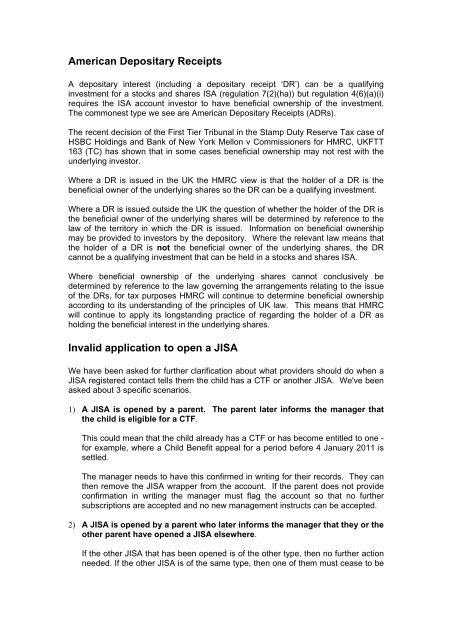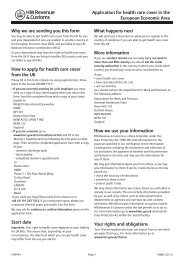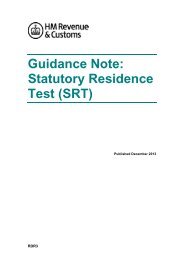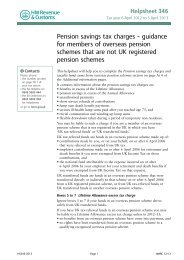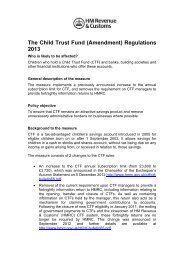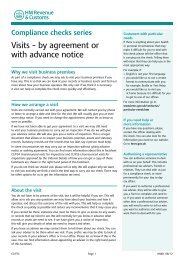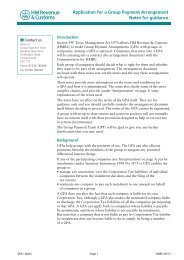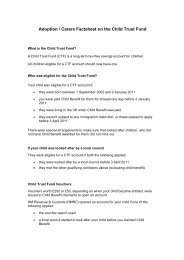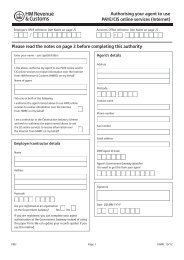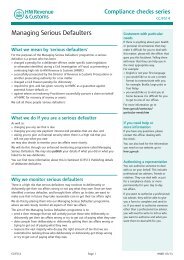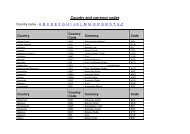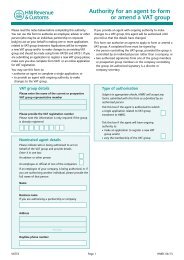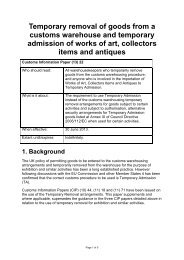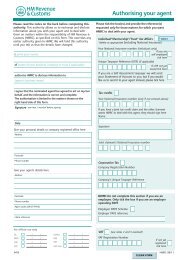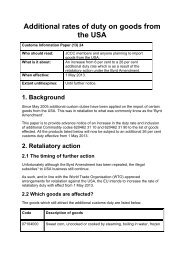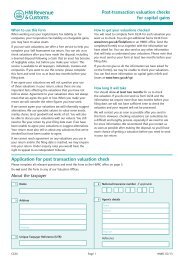ISA Bulletin 44 (PDF 93K) - HM Revenue & Customs
ISA Bulletin 44 (PDF 93K) - HM Revenue & Customs
ISA Bulletin 44 (PDF 93K) - HM Revenue & Customs
Create successful ePaper yourself
Turn your PDF publications into a flip-book with our unique Google optimized e-Paper software.
American Depositary Receipts<br />
A depositary interest (including a depositary receipt ‘DR’) can be a qualifying<br />
investment for a stocks and shares <strong>ISA</strong> (regulation 7(2)(ha)) but regulation 4(6)(a)(i)<br />
requires the <strong>ISA</strong> account investor to have beneficial ownership of the investment.<br />
The commonest type we see are American Depositary Receipts (ADRs).<br />
The recent decision of the First Tier Tribunal in the Stamp Duty Reserve Tax case of<br />
HSBC Holdings and Bank of New York Mellon v Commissioners for <strong>HM</strong>RC, UKFTT<br />
163 (TC) has shown that in some cases beneficial ownership may not rest with the<br />
underlying investor.<br />
Where a DR is issued in the UK the <strong>HM</strong>RC view is that the holder of a DR is the<br />
beneficial owner of the underlying shares so the DR can be a qualifying investment.<br />
Where a DR is issued outside the UK the question of whether the holder of the DR is<br />
the beneficial owner of the underlying shares will be determined by reference to the<br />
law of the territory in which the DR is issued. Information on beneficial ownership<br />
may be provided to investors by the depository. Where the relevant law means that<br />
the holder of a DR is not the beneficial owner of the underlying shares, the DR<br />
cannot be a qualifying investment that can be held in a stocks and shares <strong>ISA</strong>.<br />
Where beneficial ownership of the underlying shares cannot conclusively be<br />
determined by reference to the law governing the arrangements relating to the issue<br />
of the DRs, for tax purposes <strong>HM</strong>RC will continue to determine beneficial ownership<br />
according to its understanding of the principles of UK law. This means that <strong>HM</strong>RC<br />
will continue to apply its longstanding practice of regarding the holder of a DR as<br />
holding the beneficial interest in the underlying shares.<br />
Invalid application to open a J<strong>ISA</strong><br />
We have been asked for further clarification about what providers should do when a<br />
J<strong>ISA</strong> registered contact tells them the child has a CTF or another J<strong>ISA</strong>. We've been<br />
asked about 3 specific scenarios.<br />
1) A J<strong>ISA</strong> is opened by a parent. The parent later informs the manager that<br />
the child is eligible for a CTF.<br />
This could mean that the child already has a CTF or has become entitled to one -<br />
for example, where a Child Benefit appeal for a period before 4 January 2011 is<br />
settled.<br />
The manager needs to have this confirmed in writing for their records. They can<br />
then remove the J<strong>ISA</strong> wrapper from the account. If the parent does not provide<br />
confirmation in writing the manager must flag the account so that no further<br />
subscriptions are accepted and no new management instructs can be accepted.<br />
2) A J<strong>ISA</strong> is opened by a parent who later informs the manager that they or the<br />
other parent have opened a J<strong>ISA</strong> elsewhere.<br />
If the other J<strong>ISA</strong> that has been opened is of the other type, then no further action<br />
needed. If the other J<strong>ISA</strong> is of the same type, then one of them must cease to be


